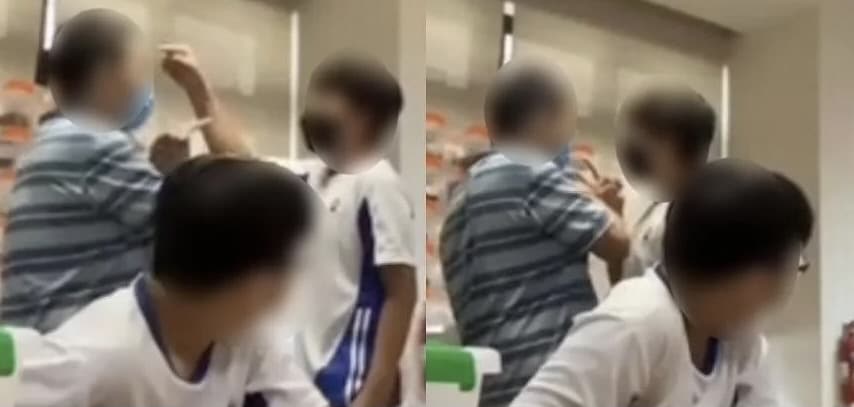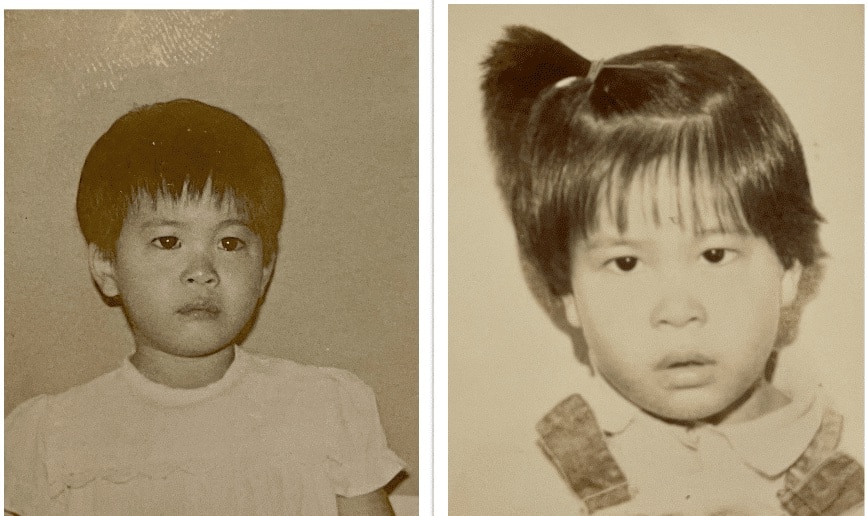Aggressive behaviour in schools on the rise? Here’s Christian counsel for parents of bullies
Emilyn Tan // August 26, 2022, 2:25 pm

In the latest school aggression video circulating online yesterday (Aug 25), a secondary schoolboy is seen confronting an adult in a classroom. Screengrabs from robinhoot.sg/instagram.
Police investigations into the brutal beating of a teenage girl by another three girls made the news last Tuesday (August 16). A video of the incident has been circulating on social media, with the victim allegedly being punched, kicked and slapped in a Sengkang carpark while two teenage boys looked on.
Yesterday (August 25), news was abuzz over a student in St Andrew’s Secondary School threatening a staff member with: “I will end your life right now, man.”
The 56-second online video prompted a story in The Straits Times, which also carried the school’s statement: “We take a serious view of disrespectful behaviour towards staff and the student has been disciplined.”
What if the perpetrator were my child?
As youths, the targets of bullying would generally be able to find help should they be open to it. There is an equal pool of counselling and other reformative resources available to the bullies, apart from corrective training.
But what of their parents or guardians? Arguably, there is less of a safe space for them in which to seek sober-minded counsel and find grace.
On their behalf, Salt&Light asked the question: “What if the perpetrator were my child?”
Advice came from:
- Graham Rozario, now a case worker with Singapore Boys’ Home, who was previously the youth worker at Pentecost Methodist Church.
- Grace Foo, a mother of four young adults, who is a Christian Ministry Staff at Anglo-Chinese Junior College.
- Amos Pang, a former teacher in the Ministry of Education system, who is now a pastor with Bethesda Bedok-Tampines Church.
1. Define your child’s qualities
Grace: Do a reality check: How well do you know your child? Can you objectively and accurately describe your child to another person? What sort of child/sibling is he/she?
Check your personal beliefs concerning your child: When you heard from school that this incident happened, and your child was named as the bully, what immediate thoughts came into your mind?
2. Establish the foundation of love
Graham: Make it known to your teen that what was done is wrong, but that you are there to support him/her and walk with him/her as they are your child and you care about them.
3. Open the channels of communication
Graham: Seek to understand your teen and why they felt the need to bully/treat the other person badly. For example, ask: “Was something done by the other person to provoke you?”
Seek to understand your teen and why they felt the need to bully/treat the other person badly.
Grace: To surface triggers for such behaviour, first ask yourself
- if there is any reason you can think of that caused him to do this?
- did he/she ever share anything about the victim?
Reflecting on both questions could surface warning signs that perhaps you overlooked and can help you be more alert in the future.
3. Scour the home ground
Grace: Reflect on the family’s method of dealing with frustration, the parental method of disciplining. Think back: This situation aside, was there a recent frustrating situation you had to deal with at home? What happened? How was it dealt with?
Amos: In my experience as a teacher, most – if not all – bullies, usually are bullies because of underlying issues at home. Do they feel neglected at home? Does the home-life model behaviour which teaches the child that not all life should be treated with equal respect?
Children who do not feel safe to be themselves at home, come to school to express themselves.
Sometimes, It could even be a home that is actually very well-intentioned in terms of discipline, but results in the child seeking an outlet for his/her chaotic energy outside of the rigid disciplinarian environment at home.
If you discover your child is/has become a bully, it wouldn’t hurt to start reflecting on the home-front situation. Is there something that needs adjusting? Can you provide more time and attention to your child, to hear what is on his or her heart?
Something we learn as educators is this: Children who feel safe to be themselves at home, are able to come to school to study. But children who do not feel safe to be themselves at home, come to school to express themselves. This is where, sometimes, behavioural issues can manifest.
Hear my heart. I am not saying that it is definitely an issue at home that is resulting in such behaviour, but it wouldn’t hurt to reassess it.
4. Gauge the emotional quotient
Grace: Has your child previously, at any other time in his life, reacted against another person in the family/school?
Bullies are usually the most lonely people in school.
This helps you to check if this sort of aggressive behaviour is a norm for your child, to check if he/she regularly lacks empathy for others, has impulsive behaviour or perhaps a neurological disorder.
Amos: Bullies are usually the most lonely people in school! Usually the object of their bullying can reveal what they themselves feel insecure about. Maybe the bully just wants to feel superior so they pick on an easy target, but it could also be that the person being bullied has something that the bully envies – material possessions, good grades, good friends.
Try sitting down with your child and really have a conversation. What is it that your child really wants that resulted in this behaviour? The actions and methods were wrong, but the needs could very well be real, and punishment without addressing their real, felt needs would just push your child away from you from future relationships with him/her as they grow older.
Seek to understand your child, before trying to help your child understand why and what he/she did was not okay.
5. Share the burden of responsibility
Amos: If your child can come to a place where he/she can understand the gravity of the actions, work together towards restorative action. How can your child apologise to the party involved so that there can be healing in any broken relationships? Help the child through being able to articulate:
How can your child apologise to the party involved so that there can be healing in any broken relationships?
- What he/she did and how that hurt ___
- Why did he/she do it and what he/she really wanted to express ___
- What he/she can do to make things right with ___
When children get into a fight, a common practice for parents is to make both parties “say sorry” to one another, but that is really too simplistic a way of expressing what apologies really are.
Guiding your child through what he/she is really sorry for, how it hurt the person and what he/she was really struggling with, allows your child to develop deeper interpersonal skills – skills which are so important for life, especially in this highly interconnected world.
6. Other considerations
Graham: Ask whether your teen was involved in the incident alone or with friends. This is to know whether there was a need for peer acceptance.
Amos: If you realise your child is the bully, it is important not to let your disappointment overflow in you. Your child will sense that, and it may make him/her feel it is too late to change and give up.
Rather, show love to your child, and come alongside him/her, to show he/she can be better and you will be there for him/her! Let this become a teaching opportunity in life!
MORE STORIES ON BULLYING:
Ask Salt&Light: Should I leave a job that is making me unhappy?
We are an independent, non-profit organisation that relies on the generosity of our readers, such as yourself, to continue serving the kingdom. Every dollar donated goes directly back into our editorial coverage.
Would you consider partnering with us in our kingdom work by supporting us financially, either as a one-off donation, or a recurring pledge?
Support Salt&Light




